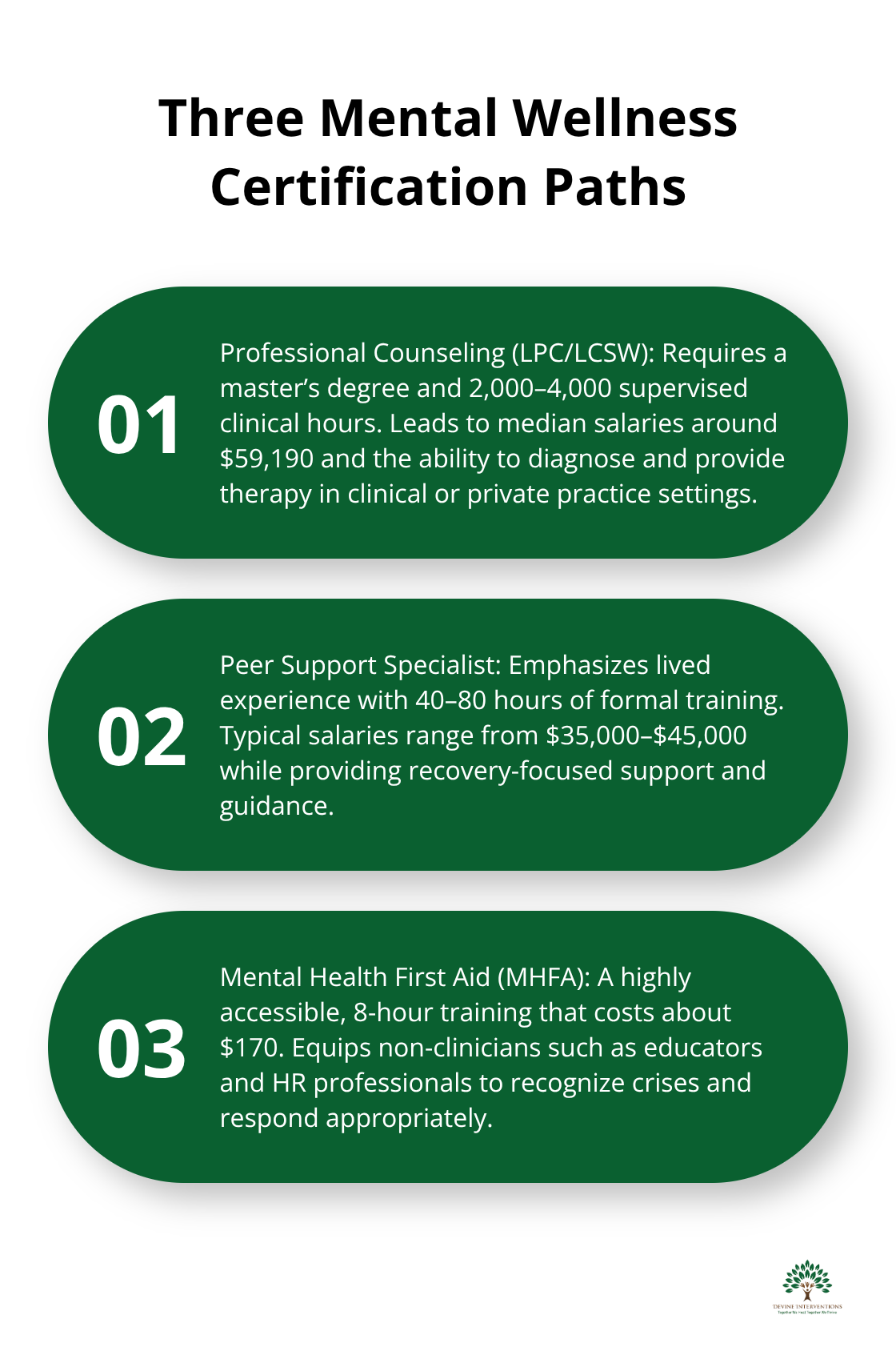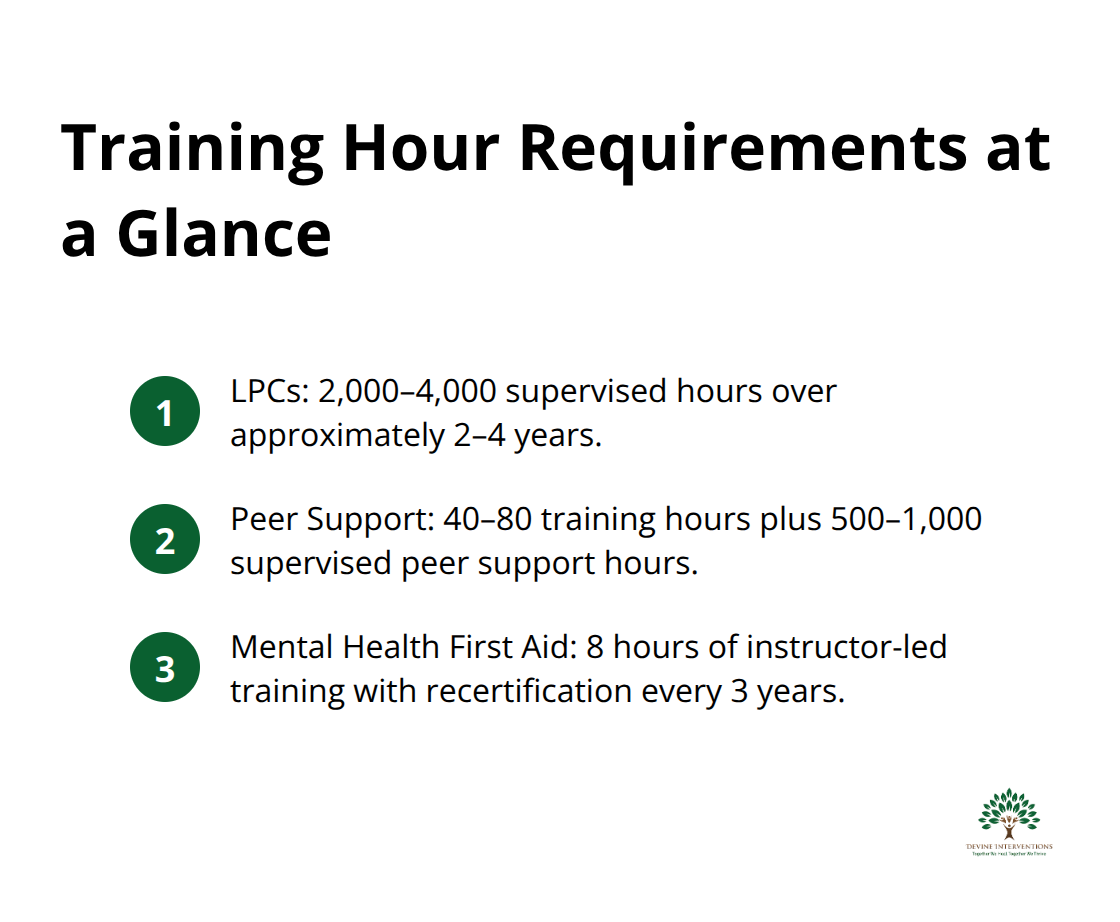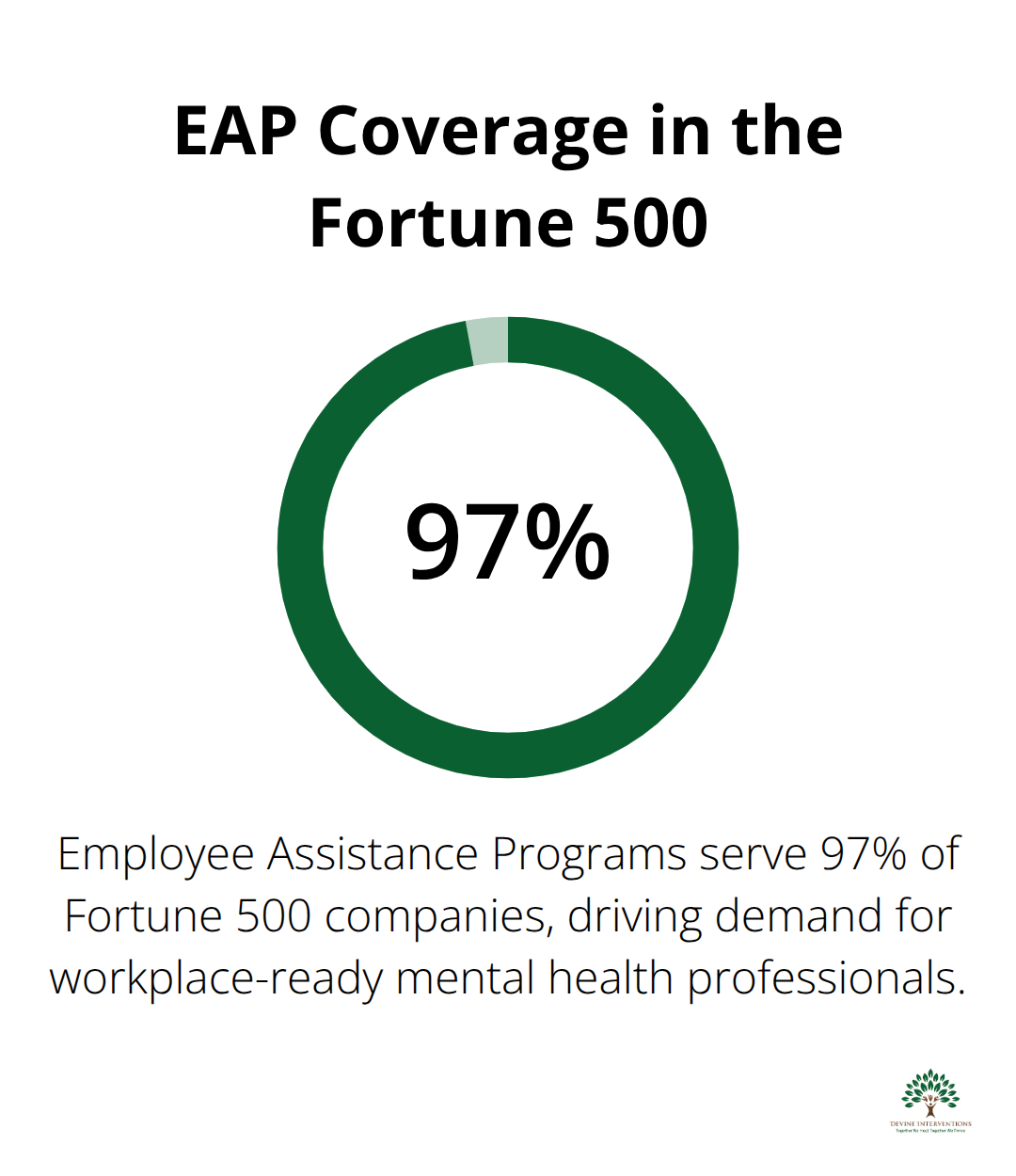The mental health field offers rewarding career paths for those passionate about helping others. Mental wellness certification opens doors to meaningful work in counseling, peer support, and community outreach.
We at Devine Interventions understand that choosing the right certification path can feel overwhelming. This guide breaks down the main certification types, requirements, and career opportunities available in mental wellness.
Which Mental Wellness Certifications Should You Consider
Mental wellness certifications fall into three main categories, each serving different career paths and salary expectations. Professional counseling certifications like Licensed Professional Counselor (LPC) or Licensed Clinical Social Worker (LCSW) require master’s degrees and 2,000-4,000 supervised clinical hours, but lead to median salaries of $59,190 according to the Bureau of Labor Statistics. These credentials allow professionals to diagnose mental health conditions and provide therapy in private practice or clinical settings.
Peer support specialist credentials offer faster entry into mental wellness careers, typically requiring 40-80 hours of training plus lived experience with mental health challenges. The National Association of Peer Supporters reports that certified peer specialists earn $35,000-$45,000 annually while they provide valuable support to individuals in recovery. Mental Health First Aid certification represents the most accessible option, requiring just 8 hours of training and costing around $170. This certification teaches recognition of mental health crises and appropriate response techniques, making it valuable for educators, HR professionals, and community leaders who want to support mental wellness in their existing roles.

Professional Counseling Paths Demand Significant Investment
Licensed counseling certifications require substantial time and financial commitment but offer the highest earning potential. Most states mandate a master’s degree in counseling or related field, plus 2-4 years of supervised practice. The National Board for Certified Counselors oversees many specialty certifications, including addiction counseling and trauma therapy. Clinical supervision typically costs $100-150 per session, adding $10,000-20,000 to certification expenses.
Peer Support Opens Doors with Personal Experience
Peer support certification values lived experience over formal education. The International Association of Peer Specialists maintains standards across 47 states, with programs that last 1-3 months. Veterans, individuals in addiction recovery, and those with mental health experience find meaningful careers as they help others navigate similar challenges. Training covers ethics, communication skills, and recovery-oriented practices.
Mental Health First Aid Builds Community Capacity
This certification trains non-professionals to identify mental health crises and connect people to appropriate resources. The program covers depression, anxiety, psychosis, and substance use disorders. Mental Health First Aid training creates a network of informed community members who can provide initial support during mental health emergencies.
Each certification path requires specific educational backgrounds and training commitments that vary significantly in scope and duration.
What Steps Lead to Mental Wellness Certification
Educational requirements vary dramatically across certification paths, and professionals must understand these differences to avoid costly mistakes. Professional counseling licenses demand master’s degrees from CACREP accredited institutions, with coursework that spans 60 credit hours in areas like abnormal psychology, ethics, and group counseling. The American Counseling Association reports that master’s programs cost $15,000-$60,000, with full-time completion that takes 2-3 years. Peer support certification takes a different approach and requires lived mental health experience plus high school completion. States like California mandate 40 hours of training while Texas requires 80 hours, with programs that cost $500-$1,500. Mental Health First Aid certification needs no educational prerequisites, which makes it accessible to teachers, managers, and community volunteers.
Training Hours Determine Your Timeline
Supervised clinical experience represents the most time-intensive requirement for professional certifications. Licensed Professional Counselors need 2,000-4,000 supervised hours across 2-4 years, with supervision that costs $100-150 per session according to the Association of State and Provincial Psychology Boards. Clinical supervisors must hold active licenses and complete supervisor training programs. Peer support specialists complete 40-80 training hours that cover recovery principles, ethics, and communication skills, followed by 500-1,000 hours of supervised peer support work.

Mental Health First Aid requires just 8 hours of instructor-led training, with recertification every 3 years.
Examinations Test Practical Knowledge
Certification exams focus on practical application rather than theoretical knowledge. The National Clinical Mental Health Counseling Examination costs $275 and includes 200 multiple-choice questions that cover assessment, counseling techniques, and ethical decision-making. Pass rates hover around 85% for first-time test-takers from accredited programs. Peer support certification exams vary by state but typically include 100-150 questions about recovery practices, boundaries, and crisis intervention. Mental Health First Aid certification requires successful completion of online modules plus in-person skills demonstration, with immediate certification upon completion. Most professional certifications require continuing education credits that range from 20-40 hours annually to maintain active status.
Application Processes Vary by State
State licensing boards maintain different application requirements and processing timelines (which can extend 3-6 months for professional licenses). Applicants must submit official transcripts, supervision documentation, and background check results. Professional counseling applications typically cost $200-500 in fees, while peer support applications range from $50-150. Some states require additional documentation like personal statements or professional references. Mental Health First Aid certification processes immediately upon course completion through the National Council for Mental Wellbeing.
These certification pathways open diverse career opportunities across multiple settings and specializations, including opportunities for trauma-focused therapy training and specialized work with vulnerable populations.
Where Can Mental Wellness Certification Take Your Career
Mental wellness certification creates pathways to diverse employment opportunities across three high-demand sectors that offer different salary ranges and work environments. Licensed Professional Counselors earn median salaries of $59,190 annually, with private practice therapists in metropolitan areas who command $80-120 per session. Private practice allows maximum flexibility and potential for higher income, but requires business management skills and client acquisition strategies. Clinical settings like hospitals and residential treatment facilities offer structured environments with salaries that start at $45,000-65,000 plus comprehensive benefits packages. These positions provide mentorship opportunities and exposure to complex cases that accelerate professional development.
Private Practice Requires Business Skills Beyond Clinical Training
Successful private practice demands marketing expertise, insurance knowledge, and client retention strategies that most certification programs never address. Therapists must invest $2,000-5,000 annually in liability insurance, office space, and electronic health records systems. Private practice therapists face significant challenges in establishing sustainable businesses. Specialization in high-demand areas like trauma therapy or addiction counseling increases session rates by 25-40% compared to generalist practitioners.
Community Mental Health Organizations Offer Stability and Mission-Driven Work
Community mental health centers provide steady employment with government funds that support comprehensive benefits and loan forgiveness programs. These organizations serve underserved populations and offer diverse programs from crisis intervention to group therapy facilitation. Peer support specialists in community settings earn $35,000-45,000 with opportunities for advancement to program coordination roles that pay $50,000-60,000. The Substance Abuse and Mental Health Services Administration reports that community mental health centers employ over 200,000 professionals nationwide.
Corporate Wellness Programs Represent the Fastest Growth Employment Sector
Employee Assistance Programs now serve 97% of Fortune 500 companies, which creates demand for mental health professionals who understand workplace dynamics and brief intervention techniques. Corporate wellness coordinators earn $45,000-70,000 with opportunities to design prevention programs and crisis response protocols. Mental Health First Aid certification particularly appeals to HR departments that seek to train managers in suicide prevention and crisis de-escalation. Companies invest $3.27 in wellness programs for every dollar spent (according to Harvard Business Review research), which drives continued expansion in this sector.

Specialized Roles Open New Career Paths
Mental wellness certification opens doors to specialized positions that traditional healthcare roles cannot access. School districts hire certified mental health professionals as crisis counselors and prevention specialists at salaries of $40,000-55,000. Military and veteran services seek professionals with trauma specialization, offering positions that start at $50,000 with federal benefits. Telehealth platforms recruit certified professionals for remote positions that provide flexibility and competitive compensation packages.
Final Thoughts
Mental wellness certification pathways offer distinct advantages based on your career goals and available resources. Professional counseling licenses provide the highest earning potential at $59,190 median salary but require master’s degrees and 2,000-4,000 supervised hours. Peer support credentials offer faster entry with 40-80 training hours and lived experience requirements, leading to $35,000-45,000 annual salaries. Mental Health First Aid certification takes just 8 hours and costs $170 (making it accessible for community leaders and HR professionals).
Professional development remains essential throughout your mental wellness certification career. Licensed counselors need 20-40 continuing education hours annually, while peer specialists must complete ongoing training to maintain credentials. The mental health field evolves rapidly with new treatment approaches and research findings that require constant learning.
Start your mental wellness certification journey with honest assessment of your educational background, financial resources, and career timeline. Research state-specific requirements early, as licensing boards maintain different standards and processing times. Consider connecting with established professionals who can provide mentorship and guidance throughout the certification process. Devine Interventions supports qualified mental health professionals who transform lives through evidence-based treatment and compassionate care.







